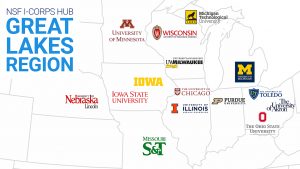
The NSF I-Corps Hub: Great Lakes Region had an exciting first year as one of the first I-Corps Hubs in the nation. It has been a tremendous year of growth as we have strived to work together across 12+ institutions to deliver high-quality entrepreneurship training to scientists, engineers, and innovators.
To celebrate our one-year anniversary, let’s take a moment to highlight some success stories, achievements, and progress we have made over the past year.
I-Corps Inspires New Perspectives for Researchers
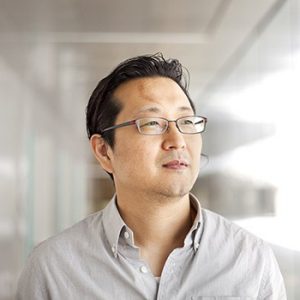
There is no denying that publications are an essential cornerstone of an academic’s career. But, I-Corps provides an opportunity for researchers to go beyond the publication. Dr. SangHyun Lee from the University of Michigan did just that: he learned from I-Corps which enabled him to create a new company centered around sensorless motion tracking technology. The innovation has the potential to improve ergonomics and working conditions for factory workers.
When I did research before I-Corps, I cared mostly about the science, how things worked, and how they could be improved. I needed that information to create more academic products like publications,” Lee explained. “What is missing in literature? What are the knowledge gaps? After I-Corps, I take into account what is missing in our society, how my research can be applied to the real world, and what the impact on society is. – Dr. SangHyun Lee
I-Corps Creates Opportunities for Students
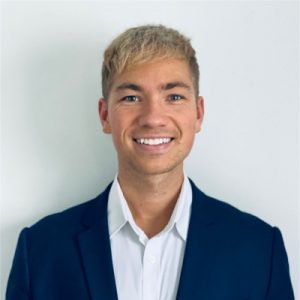
Isaiah Kaiser, a Ph.D. student from the University of Akron, discovered new technologies, partners, and career opportunities from participating in the I-Corps Program.
Throughout his education as an engineering student, Kaiser began to take an interest in business and making a difference with his work. This led to him taking business classes, and eventually, joining an I-Corps team. The team has an innovative medical technology that improves the treatment of long-term wounds and infections. For Kaiser, I-Corps provided the opportunities he was looking for.
I-Corps really opened my eyes to a lot of different opportunities. It put me in front of potential customers, stakeholders, and even potential investors in some cases. From that perspective, it really changed my mindset in a lot of areas. It exposed me to a lot of new possibilities. But for me, this idea and this process has not just been a project. It has been more of a dream and something that I’ve wanted to really do. When I think about my career and life post-graduation, I see Auxilium [the team’s company], being the focal point. – Isaiah Kaiser
Professional Development and Growth with I-Corps

While studying for a Master’s in Health Informatics, Michel Duong and her colleagues participated in a local I-Corps program to accelerate their idea that eventually became Canopy – a web application that helped people talk about, make, and share end-of-life healthcare decisions. Duong describes how I-Corps taught her new and valuable skills.
I-Corps really emphasized customer discovery, and I know a lot of times as a newer entrepreneur, it can be scary to go talk to people,” Duong said. “Being able to learn those skills early on through the I-Corps program, and understand what questions you should ask, how you should ask them, and how you should write a discussion guide was a really helpful thing to be able to learn through I-Corps. And, it really helped us continue to understand those challenges in the population we were trying to serve. – Michel Duong
Year One by the Numbers
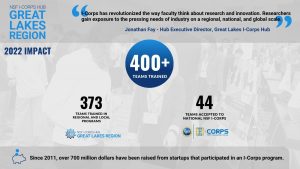
The Great Lakes Hub has successfully trained over 400 teams and 1,000 people across our various institutions and programs in only one year’s time. These teams gained valuable professional development, insights into the potential of commercializing their innovation, and learned the cornerstones of customer discovery. The Hub has sent 44 teams to the National NSF I-Corps Teams program, where they will continue their journey to become innovators by conducting over 100 customer interviews over just 7 weeks. In addition, our Hub has gained 3 new member institutions and now includes 15 universities working together to train the next generation of innovators.
The Great Lakes I-Corps Hub has had a fantastic year. But what gets me most excited is the impact that participants will have over the next decade. These innovators will reshape everything from agriculture, healthcare, energy, manufacturing, to software and social services. You name it, we’ve worked with innovators trying to make it better.” – Jonathan Fay, Hub Executive Director
Great Lakes Hub’s Innovative Research
The Hub has a research team made up of researchers from three different partner institutions: the University of Michigan, Purdue University, and the University of Illinois Urbana-Champaign. The research team investigates many aspects of the I-Corps program, including the impact of I-Corps programs, diversity in higher education, and educational training. The team has presented at four conferences in 2022 and delivered an award-winning paper on the Evaluation of the NSF I-Corps program.
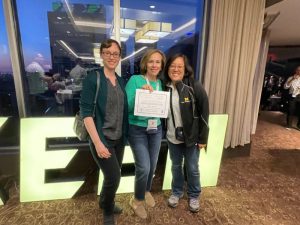
The research team after winning best paper in ASEE 2022 entrepreneurship division for the paper “Catalyzing U.S. Innovation and Entrepreneurship: Approaching the Evaluation of the National Science Foundation’s I-Corps Program” Link to paper
Excitement for the Future
In our first year, we expanded our regional cooperation, enabled cutting-edge research to make an impact on the world, and broadened participation in our programs to include more underrepresented individuals. In 2023, we will train more innovators on the importance of customer discovery and enable more inventions to leave the laboratory and have an economic impact. We look forward to the second year of the Great Lakes Hub, and a new year with new possibilities.
Learn more about the Hub
Follow us on Linkedin
